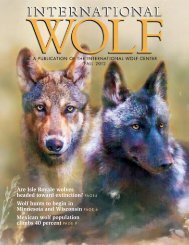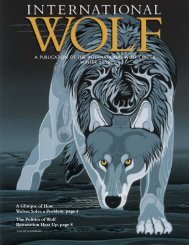a publication of the international wolf center spring 2007
a publication of the international wolf center spring 2007
a publication of the international wolf center spring 2007
You also want an ePaper? Increase the reach of your titles
YUMPU automatically turns print PDFs into web optimized ePapers that Google loves.
Isaac Babcock<br />
Through learning processes like habituation a <strong>wolf</strong> can<br />
adapt its responses to specific, civilization-dependent<br />
stimuli. The <strong>wolf</strong>’s fearful response to stimuli, like streets,<br />
vehicles or buildings, will gradually wane.<br />
example, became habituated to<br />
researchers within several weeks; in<br />
o<strong>the</strong>r areas habituation took several<br />
months. Also <strong>the</strong> intensity <strong>of</strong> <strong>the</strong><br />
stimulus matters; <strong>the</strong> higher <strong>the</strong><br />
intensity <strong>of</strong> <strong>the</strong> stimulus, <strong>the</strong> longer<br />
<strong>the</strong> process takes.<br />
Habituation also varies among<br />
individual animals. Some wolves<br />
habituate faster to <strong>the</strong> stimuli <strong>of</strong> civilization<br />
than o<strong>the</strong>rs; some habituate<br />
only after a longer period <strong>of</strong> learning,<br />
and some never habituate at all.<br />
Habituation to humans can affect<br />
<strong>the</strong> survival <strong>of</strong> an individual. Because<br />
<strong>the</strong> <strong>wolf</strong> that does not respond to a<br />
stimulus saves energy, habituation can<br />
lead to an advantage in competition<br />
with o<strong>the</strong>r wolves. The saved energy<br />
can be invested in o<strong>the</strong>r, essential<br />
behavior such as reproduction.<br />
Thus, areas developed by humans<br />
can become usable habitat for wolves.<br />
Wolves require <strong>the</strong> adequate presence<br />
<strong>of</strong> certain essential ecological factors<br />
in <strong>the</strong>ir environment, such as food<br />
and shelter, whe<strong>the</strong>r that environment<br />
is wilderness or an urban area.<br />
A <strong>wolf</strong> can raise pups in a den in<br />
a remote area or in an abandoned<br />
building, as a female <strong>wolf</strong> did in Italy.<br />
Habituated animals can find new<br />
food sources in urban landscapes. The<br />
food supply in urban areas is plentiful<br />
and fluctuates little, and food is<br />
mostly attainable without great expenditure<br />
<strong>of</strong> energy. Wildlife species,<br />
like habituated deer and rabbits, are<br />
one important source. Additionally,<br />
domestic animals like dogs or cats are<br />
a fur<strong>the</strong>r potential food source for<br />
wolves. Ano<strong>the</strong>r important food supply<br />
is garbage. For a <strong>wolf</strong> population in<br />
Italy, 60 to 70 percent <strong>of</strong> <strong>the</strong> total food<br />
intake consisted <strong>of</strong> garbage. Wolves<br />
are attracted by <strong>the</strong>se food sources and<br />
begin to connect positive consequences<br />
with <strong>the</strong>m, which is one<br />
reason why wolves are moving into<br />
suburban and urban areas in Europe.<br />
In <strong>the</strong> past few years <strong>the</strong>re have<br />
been cases <strong>of</strong> human-habituated<br />
wolves in Romania, Italy and o<strong>the</strong>r<br />
European countries. In Italy, for<br />
example, wolves moved several times<br />
into a city with 30,000 inhabitants.<br />
Ano<strong>the</strong>r <strong>wolf</strong> was observed on his<br />
way through <strong>the</strong> middle <strong>of</strong> an Italian<br />
village, where he passed a tennis<br />
court, traveled along an empty swimming<br />
pool and <strong>the</strong>n crossed a street<br />
used by many pedestrians during<br />
<strong>the</strong> day. In Germany, wolves have<br />
moved into a military training area<br />
and have become habituated to <strong>the</strong><br />
firing <strong>of</strong> <strong>the</strong> soldiers’ guns.<br />
The most famous case <strong>of</strong> a habituated<br />
<strong>wolf</strong> in Europe took place in<br />
Brasov, a Romanian town with about<br />
300,000 inhabitants. In <strong>the</strong> course <strong>of</strong><br />
a research project a female <strong>wolf</strong> was<br />
radio-tracked on her way through <strong>the</strong><br />
town in <strong>the</strong> evening hours. She<br />
crossed streets with heavy traffic, ran<br />
through housing estates and passed<br />
parked cars without showing any<br />
sign <strong>of</strong> shyness toward <strong>the</strong>se stimuli.<br />
In Europe, where <strong>wolf</strong> populations<br />
are gradually increasing in most<br />
countries, <strong>the</strong> number <strong>of</strong> humanhabituated<br />
animals will also increase.<br />
The <strong>wolf</strong> is widely protected by<br />
national laws, and expanding suburban<br />
and urban areas provide sufficient<br />
prey for wolves. In <strong>the</strong> absence<br />
<strong>of</strong> persecution and given <strong>the</strong> presence<br />
<strong>of</strong> suitable resources, wolves will<br />
move into <strong>the</strong>se urban areas. The challenge<br />
for <strong>the</strong> inhabitants <strong>of</strong> civilized<br />
areas is to recognize that <strong>the</strong> <strong>wolf</strong> is no<br />
“beast in <strong>the</strong> garden” and no lost<br />
roamer <strong>of</strong> snowy hills but an animal<br />
with an amazing ability to adapt. ■<br />
Florian Wetzel received a M.Sc. in<br />
ecology from <strong>the</strong> Technical University <strong>of</strong><br />
Munich in Germany. His master’s <strong>the</strong>sis<br />
is about <strong>the</strong> habituation <strong>of</strong> wolves to civilization-dependent<br />
stimuli. He is now a<br />
Ph.D. candidate at <strong>the</strong> Konrad Lorenz<br />
Institute for Ethology in Vienna, Austria.<br />
International Wolf Spring <strong>2007</strong> 9<br />
International Wolf Center







